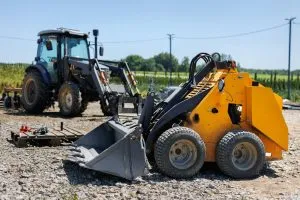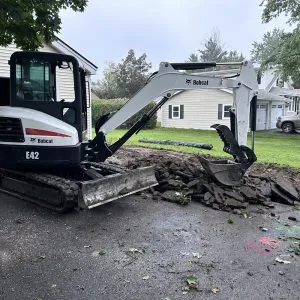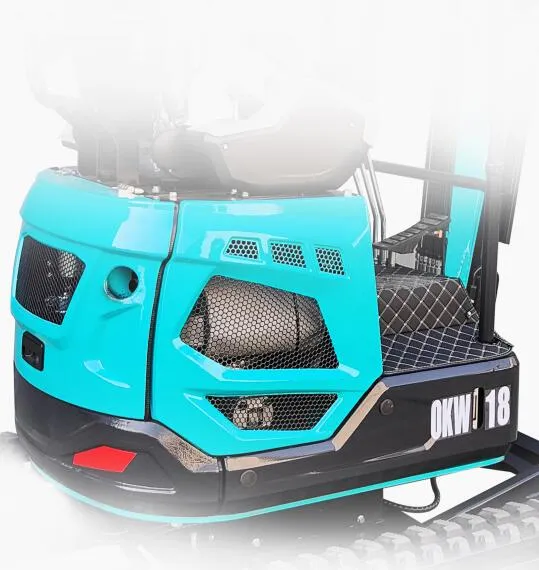Mini excavators are vital tools in the construction and landscaping industries, known for their compact size, versatility, and efficiency. Among the various specifications and terminologies associated with these machines, the term “LC” often appears, leaving many wondering what it actually means. In this article, we’ll explore what “LC” stands for in the context of mini excavators, why it’s important, and how it impacts the machine’s performance and suitability for different tasks.

Understanding the Basics of Mini Excavators
Before diving into the meaning of “LC,” it’s essential to understand what mini excavators are and how they are used. Mini excavators, also known as compact excavators, are smaller versions of standard excavators, typically weighing between 1 and 10 tons. These machines are designed to perform various digging, lifting, and earthmoving tasks in confined spaces where larger equipment cannot operate efficiently.
Common Applications of Mini Excavators
Mini excavators are highly versatile and used in a wide range of applications, including:
- Residential Construction: For tasks like digging foundations, trenches, and landscaping.
- Utility Work: For installing or repairing underground utilities, such as water, gas, and electrical lines.
- Road Work: For digging and grading in areas where space is limited.
- Demolition: For small-scale demolition tasks, particularly in urban environments.
Their compact size, ability to maneuver in tight spaces, and compatibility with various attachments make mini excavators an indispensable tool on many job sites.
Decoding the “LC” in Mini Excavators
The term “LC” in the context of mini excavators stands for “Long Carriage.” This designation refers to a specific design feature related to the undercarriage of the excavator. The undercarriage is the part of the excavator that includes the tracks or wheels and supports the machine’s weight, allowing it to move and operate.
What Is a Long Carriage?
A “Long Carriage” (LC) excavator features an extended undercarriage with longer tracks compared to standard models. The longer tracks provide a larger footprint, which enhances the machine’s stability, particularly when working on uneven terrain or when lifting heavy loads.

Key Benefits of Long Carriage (LC) Excavators
The LC configuration offers several advantages, making it a preferred choice for certain applications:
1. Enhanced Stability
One of the primary benefits of an LC mini excavator is its improved stability. The extended tracks distribute the machine’s weight over a larger area, reducing the ground pressure and minimizing the risk of tipping over. This stability is crucial when working on slopes, uneven surfaces, or when handling heavy materials.
2. Better Lifting Capacity
The increased stability of LC excavators translates to a higher lifting capacity. With a more stable base, these machines can lift and move heavier loads without compromising safety or performance. This makes LC mini excavators ideal for tasks that involve heavy lifting, such as placing large pipes or handling dense materials.
3. Improved Traction
The longer tracks on an LC mini excavator also provide better traction, especially on soft or loose ground. This enhanced traction allows the machine to operate more effectively in challenging conditions, such as muddy or sandy terrain, where standard excavators might struggle.
4. Smoother Operation
The extended undercarriage of an LC excavator contributes to a smoother and more controlled operation. The machine’s movements are more balanced and less prone to abrupt shifts, which is particularly beneficial when performing precise tasks or working in confined spaces.
When to Choose an LC Mini Excavator
While LC mini excavators offer distinct advantages, they are not always the best choice for every job. Understanding when to opt for an LC model can help maximize efficiency and safety on the job site.
1. Working on Uneven Terrain
If your project involves working on uneven or sloped ground, an LC mini excavator is an excellent choice. The enhanced stability provided by the longer tracks reduces the risk of tipping and ensures smoother operation on challenging terrain.
2. Lifting Heavy Loads
For tasks that require lifting and moving heavy objects, such as large rocks, construction materials, or heavy pipes, an LC excavator’s increased lifting capacity is highly beneficial. The stable base allows the machine to handle heavier loads with greater ease and safety.
3. Operating in Soft Ground Conditions
In environments with soft, loose, or muddy ground, the extended tracks of an LC mini excavator offer better traction and prevent the machine from getting stuck. This makes LC models more reliable in such conditions, ensuring continuous operation without frequent interruptions.
4. Precision Work in Confined Spaces
While LC excavators are slightly larger due to their extended undercarriage, they still maintain a compact design suitable for tight spaces. If your project requires precise work in confined areas, an LC mini excavator can provide the stability and control needed for accurate digging, grading, or lifting.

Considerations Before Choosing an LC Mini Excavator
Despite the advantages of LC mini excavators, there are some considerations to keep in mind:
1. Larger Footprint
The extended tracks of an LC mini excavator mean it has a larger footprint compared to standard models. This can be a drawback in extremely tight spaces where maneuverability is a top priority. If your project involves working in very confined areas, you may need to assess whether the benefits of an LC model outweigh the potential challenges.
2. Higher Cost
LC models may come with a higher price tag due to their enhanced features. It’s important to consider your project’s budget and determine if the additional stability and lifting capacity justify the extra cost.
3. Potential for Increased Ground Disturbance
The larger footprint of an LC mini excavator can also lead to increased ground disturbance, particularly in sensitive environments. If minimizing environmental impact is a priority, you may need to weigh this factor when choosing between an LC model and a standard mini excavator.
Conclusion
In the world of mini excavators, the term “LC” stands for “Long Carriage,” indicating a machine with an extended undercarriage designed to enhance stability, lifting capacity, and traction. LC mini excavators are particularly well-suited for projects involving uneven terrain, heavy lifting, and challenging ground conditions. However, their larger footprint and potentially higher cost may not make them the ideal choice for every situation.
When selecting a mini excavator for your project, it’s essential to consider the specific demands of the job and the advantages that an LC model can offer. By understanding what “LC” means and how it impacts the machine’s performance, you can make an informed decision that ensures efficiency, safety, and success on your job site.






